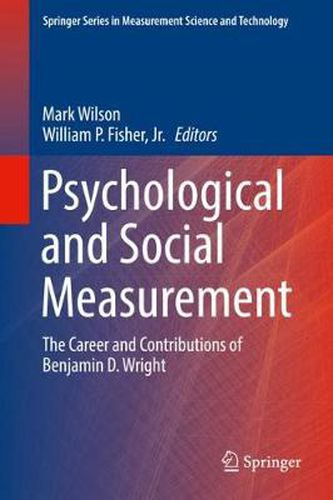Readings Newsletter
Become a Readings Member to make your shopping experience even easier.
Sign in or sign up for free!
You’re not far away from qualifying for FREE standard shipping within Australia
You’ve qualified for FREE standard shipping within Australia
The cart is loading…






This title is printed to order. This book may have been self-published. If so, we cannot guarantee the quality of the content. In the main most books will have gone through the editing process however some may not. We therefore suggest that you be aware of this before ordering this book. If in doubt check either the author or publisher’s details as we are unable to accept any returns unless they are faulty. Please contact us if you have any questions.
In this tribute to Benjamin Wright, former students and colleagues recall the foundational contributions he made to the theory and practice of measurement in a career spanning over five decades. Wright is recognized as the foremost proponent of the psychometric approach of Georg Rasch, a Danish mathematician, whose ideas continue to provoke controversy. Wright’s colleagues and students, and students of their students, are leaders in educational research and practice around the world. This volume relates the extent of Wright’s influence far beyond education and psychology, where his work in measurement began, into health care and the social sciences at large. The editors and contributors-all leading measurement scholars-trace the development of themes in Wright’s work, identifying the roots of today’s formative assessment methods, the integration of quantitative and qualitative data, and the contrast between scientific and statistical methods. These previously unpublished papers reflect on Wright’s lifelong passion for making measurement both more scientific and more meaningful. They recount how Wright’s insight, energy, and gregarious nature led him to produce multiple innovations in computing, estimation methods, model development, fit assessment, and reliability theory, stimulating practical applications in dozens of fields, serving on over 120 dissertation committees, and founding several professional societies. The volume includes three reprinted articles by Wright that provide insights into his early engagement with Rasch’s ideas.
Psychological and Social Measurement will be welcomed by the broad international measurement community of professionals and researchers working in such diverse fields as education, psychology, health sciences, management, and metrology. Scientists working in any field involving measurement science and technology will appreciate an inside look at this seminal figure and a new perspective on the expanding conversation across the sciences about measurement and the communication of meaningful, transparent information.
$9.00 standard shipping within Australia
FREE standard shipping within Australia for orders over $100.00
Express & International shipping calculated at checkout
This title is printed to order. This book may have been self-published. If so, we cannot guarantee the quality of the content. In the main most books will have gone through the editing process however some may not. We therefore suggest that you be aware of this before ordering this book. If in doubt check either the author or publisher’s details as we are unable to accept any returns unless they are faulty. Please contact us if you have any questions.
In this tribute to Benjamin Wright, former students and colleagues recall the foundational contributions he made to the theory and practice of measurement in a career spanning over five decades. Wright is recognized as the foremost proponent of the psychometric approach of Georg Rasch, a Danish mathematician, whose ideas continue to provoke controversy. Wright’s colleagues and students, and students of their students, are leaders in educational research and practice around the world. This volume relates the extent of Wright’s influence far beyond education and psychology, where his work in measurement began, into health care and the social sciences at large. The editors and contributors-all leading measurement scholars-trace the development of themes in Wright’s work, identifying the roots of today’s formative assessment methods, the integration of quantitative and qualitative data, and the contrast between scientific and statistical methods. These previously unpublished papers reflect on Wright’s lifelong passion for making measurement both more scientific and more meaningful. They recount how Wright’s insight, energy, and gregarious nature led him to produce multiple innovations in computing, estimation methods, model development, fit assessment, and reliability theory, stimulating practical applications in dozens of fields, serving on over 120 dissertation committees, and founding several professional societies. The volume includes three reprinted articles by Wright that provide insights into his early engagement with Rasch’s ideas.
Psychological and Social Measurement will be welcomed by the broad international measurement community of professionals and researchers working in such diverse fields as education, psychology, health sciences, management, and metrology. Scientists working in any field involving measurement science and technology will appreciate an inside look at this seminal figure and a new perspective on the expanding conversation across the sciences about measurement and the communication of meaningful, transparent information.